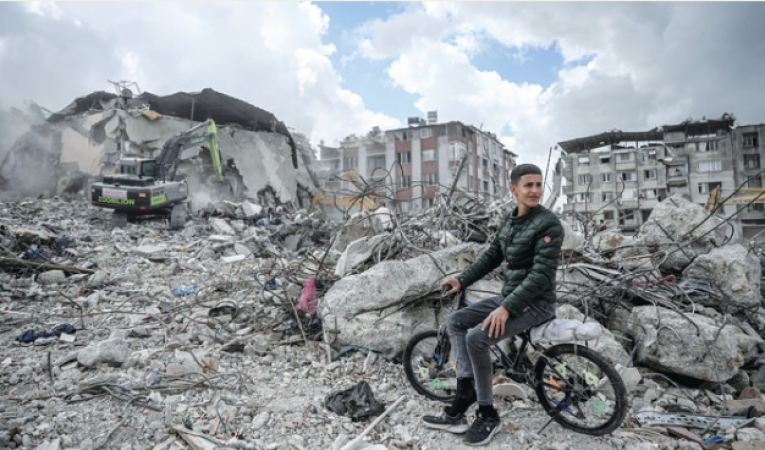
Antkaya: Ali Cimen, a retired construction worker, scoffed at the notion that Turkiye's earthquake disaster zone could be rebuilt in a year as he observed the heap of rubble raising dust over his former neighbourhood.
In the ancient Syrian border city of Antakya, a half-dozen growling excavators were razing what remained of the 60-year-old apartment complex. Hundreds more raised a cacophony of noise across this mountain-ringed mashup of ancient civilization as they swung their enormous arms.
Before it joined Turkiye, Antakya was known as Antioch and took on the reputation of one of the region's most independent cities.
Also Read: Seoul urges North Korea to stop using a factory complex in an unauthorized manner
Its skeletal remains, which have been swaying precariously since a 7.8-magnitude earthquake unleashed its destruction exactly two months ago, were now being reduced to dust and rubble.
There is a great deal of social and political discussion surrounding what should take their place and when. Cimen, who was witnessing the destruction of his home, said, "I don't think the reconstruction can be finished in a year."
possibly someplace else. However, in this situation, clearing the debris by yourself will take at least a year.
Also Read: Various events will be held in London to commemorate King Charles' coronation
Prior to the elections on May 14th, President Recep Tayyip Erdogan's leadership was put to the test as Antakya took the brunt of a catastrophe that claimed more than 50,000 lives. By the beginning of the following year, Erdogan has boldly promised to rebuild the entire disaster area, which was once home to more than 13 million people.
Few people who still live in this city's hollow shell do so. From piles of unchecked rubble and random street corners, the smell of decomposing bodies drifts in with the wind.
Laundry lines reveal evidence of life enduring amidst all the ruins and emptiness.
The old city centre, which was once a bustling maze of romantic cafes and boutique shops, is still inaccessible in some places due to meters-high mounds of debris. On Wednesday, Erdogan announced to the country that the Hatay province of Antakya had already had half of the debris removed.
Gokhan Karaoglan, a retired man, treated Erdogan's promises with a healthy amount of scorn. The 54-year-old said, "It's been two months and they still haven't cleared the rubble."
Another three, four, or five years will pass. We are currently living in misery. Buildings most likely to collapse were demolished first, according to the chief engineer at the demolition site.
Even the damaged buildings you can still see standing will eventually be demolished, according to Murat Sirma. When this is all over, "I think very few buildings will remain," predicted the 45-year-old. "Perhaps five to ten percent of them."
It is risky work. Asbestos, an insulator linked to cancer, is mixed in with the dust, along with cement and other toxic materials.
Large portions of buildings frequently collapse in a tidal wave that blankets the entire site in obnoxious dust plumes. The employees frequently don face masks. Residents who have gathered to observe the destruction do not.
In Hatay, there are 1,000 excavators at work, according to Sirma. "That's a lot of work," someone said. The outer roads of that city are clogged with hefty lorries loaded up with rubble.
They stomp along as they approach one of the few government-designated landfills that are later drenched in water to reduce the amount of dust. Many people in Antakya seem to be so overwhelmed by shock and grief that they are unable to clearly picture the future once all the debris has been cleared away.
Also Read: Trump is blamed in Biden's review of the chaotic Afghan withdrawal
Turkiye's track record of restoring historic cities is marred by Diyarbakir, a predominantly Kurdish city whose twice-rebuilt old town lacks much of the charm of the original. Engineer Sirma stated that once all the debris is cleared away, new plans for Antakya's construction would be laid out.
Emina Burc was unable to plan that far in advance. The 39-year-old divorcee gathered with a small group of people to watch excavators demolish her house's foundation.
She confessed, "To be honest, I feel like we're the living dead." Karaoglan, however, claimed he was holding onto hope. He declared, "This is where I was born, this is where I made my home, and this is where I'll pass away."